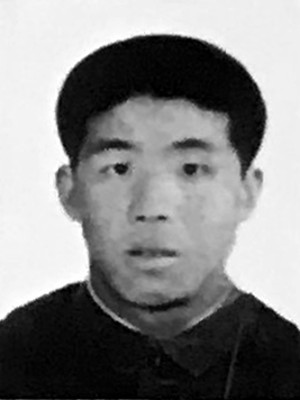Male, 33, peasant and driver for a truck fleet. From Xitaishang Village, Miaocheng Township, Huairou District, Beijing.
In June 1989, the truck fleet Lei was part of was tasked with transporting soil for the construction of the Customs House on Jianguomennei Avenue in Beijing. On June 3, shortly after 10 p.m., Lei and two other drivers went to Tiananmen Square to view the Goddess of Democracy statue. After 11 p.m., near the red wall at the southern intersection of Nanchizi, west of Tiananmen Square, Lei ran into advancing martial law troops who were firing. Lei was shot and collapsed. Those around him hauled him away on a three-wheeled cart. What happened afterward remains unknown. Lei’s wife had searched for him at 18 hospitals but never found him.
Lei was known in his village for his honesty. He left behind his wife, an eight-year-old son, and a one-year-old daughter. His wife did not sleep for a week following his disappearance and has suffered from headaches ever since. She went to the authorities many times to seek help but never received any. She never remarried. She worked 20 mu (about 1.7 acre) of land on her own to raise her two children.
Lei’s, wife, Fang Duizhen (方桂珍), and son, Lei Yong (雷勇), are both members of the Tiananmen Mothers.

See Lei Guangtai’s story (04:27-06:41) in “Portraits of Loss and the Quest for Justice,” HRIC documentary (2009)
“The Beijing evening news reported that people being killed in Tiananmen was a lie. I got really nervous. On June 5 they took me to Xiehe Hospital. When we got there, they took out a bunch of photos… I knew what my husband was wearing, but you couldn’t even see the faces. They were burnt and bloody. Their chests were full of wounds and holes. . . . My work unit took me to Beijing’s 18 major hospitals. There wasn’t one I didn’t go to. He was simply gone! . . . Everyone said, “We’ll take care of you.” To this day, no one has given me a cent. They even discriminate against me. I’ve been holding back tears for so many years.”
Zhang Xianling [a founding member of the Tiananmen Mothers] often said to me that Fang Guizhen has been suffering enormously, enduring great hardships—but she has never bowed down to fate. I had wanted to visit her too, but had not found a good opportunity to do so.
This year, just before Chinese New Year, our wish finally came true with the help of a friend. We left Beijing in the early morning, driving 80 kilometers straight to Xitaishang Village in Miaocheng Township, Huairou District. It was almost noon when we found Fang Guizhen’s house. The Fang residence was located at the edge of the village near an abandoned fishpond. The pond had been turned into a junkyard, filled with all kinds of trash. It seemed that no one took care of it. Fang’s house was a stand-alone structure, and not a small one either. But the yard was a terrible mess. It felt like none of the farm tools or household utensils were in its place, and it looked like it had not been tidied up in a very long while. When we stepped inside, it was completely empty. Other than the brick bed in the inner room, a stove in the outer hall, and a small coal-heater in the center of the house, there was practically nothing that looked presentable. Although Beijing had a warm winter, it was nevertheless close to Chinese New Year and the weather was very cold. The Fang family did not have any of the heating equipment commonly seen in rural villages. It relied only on sunlight during the day and the stove during the night for warmth.
Fang Guizhen was slim, with a certain grace to her features. But her face was covered in grime from hardship, and her thinning hair was parted into two little braids, clearly to save time on combing and washing. She was dressed carelessly, still wearing a men’s yellow uniform that was popular in the 1960s and 1970s. It looked especially loose on her and ill-fitting. She was wearing cotton pants covered with dust, and a pair of worn black corduroy shoes. It looked like she had long gotten used to not grooming herself.
Seeing her home and meeting her in person made my heart swell in sadness. I thought, if her husband had not died, would she still look like this?
Through this interview, I understood keenly what the massacre fourteen years ago had done to a peasant’s wife who lost her husband. I carefully studied her pre-maturely aged countenance again, and saw in every wrinkle on her face—like rings of a tree—the scars left behind by her struggle with hardship.